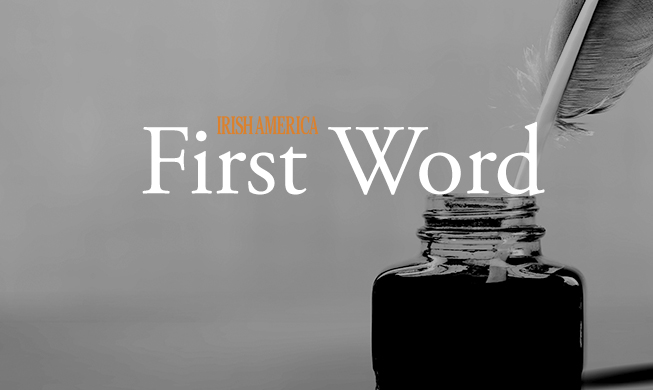
History says, don’t hope on this side of the grave. But then, once in a lifetime the longed-for tidal wave of justice can rise up and hope and history rhyme. So hope for a great sea-change on the far side of revenge. Believe that a further shore is reachable from here. Believe in miracles and cures and healing wells. – Seamus Heaney (The Cure at Troy).
The Americans, having undertaken the task of bringing the message of tolerance to a people divided, carried it off with great skill and panache. The speeches were flawless, the message rich is history and the art of compromise, the delivery without stumble. So beautifully was the President’s visit to Ireland executed, in fact, that by the time it ended, and the poet Seamus Heaney presented Bill Clinton with a hand-written copy of the poem (excerpted above) that he had cited some six times in two days’ visit, we were all believing in “miracles and cures and healing wells.”
For the American President proved to be a forceful communicator, who managed, with exceptional evenhandedness, to win over even the most hardened cynics to the possibilities of peace.
As Anna Hanna, a Belfast Protestant, told the New York Times, “I didn’t think his presence would do much good, but he was absolutely first class, and after listening to him, I think he will help people come together.”
And come together they did – in their thousands – 28,000 in Belfast – one in ten citizens, Protestant and Catholic – who left their grievances aside to greet he man who had helped to silence the guns. And that quiet hope that had lain at the bottom of people’s hearts for 15 months at last became a “tidal wave” and the visiting American became the medium through which their desire, “I see that the people want peace, and the people will have peace,” expressed itself.
To Belfast, Derry, and Dublin the persuasive President brought his message, in turn cajoling: “Those who show the courage to break with the past are entitled to their stake in the future,” and forceful: “Violence has no place at the table of democracy and no role in the future of this land.” He heaped praise on the Irish – their writers, troops who served on U.N. peacekeeping missions, young people who organized against world hunger. Taking them outside the confines their small country and making them see themselves in the context of the world.
Addressing the crowd in Guidhall Square in Derry, that embattled city of so much history – the place upon which the street plan of Philadelphia was based – he cited the example of William Penn, the Irish Protestant turned Quaker, who turned away from warfare to found Philadelphia as a place where he hoped that people of all persuasions could live in harmony. His motto was E Pluribus Unum, “Out of many, one.”
It was easy to believe “On days Like This,” as the Van Morrison song goes – the one he sang for the president in Belfast, that a “further shore [was] reachable.” But now that the American show has left town, the full realization that peace is infinitely more arduous than war, is sinking in.
G.B. Shaw, whom the president quoted understood that old habits an hard grudges ar not easily laid aside. But in the arduous journey towards a lasting peace we can look back on a couple of days when grudges were put aside, and “hope and history rhymed.” E Pluribus Unum. And people from both sides of the divide came together to cheer the American President, and we can use that memory to carry on.
And we would do well to remember the President’s parting words. Invoking the legacy of the Civil War he quoted a former confederate governor of Arkansas:
“We have all done wrong. No one can say his heart is altogether clean and his hands altogether pure. Thus as we wish to be forgiven, let us forgive those who have sinned against us and ours.” This, the President said, “was the beginning of America’s reconciliation, and it can be the beginning of Northern Ireland’s reconciliation.’
What a great beginning to 1996 that would be.
Editor’s Note: This article was originally published in the January/February 1996 issue of Irish America. ⬥


Leave a Reply